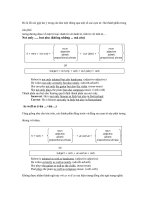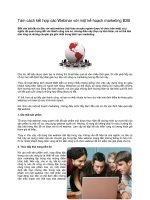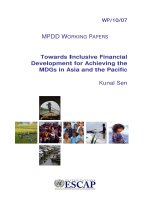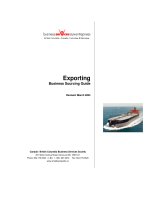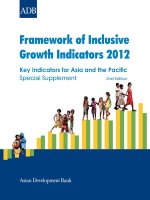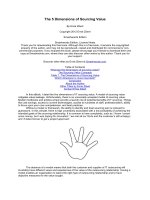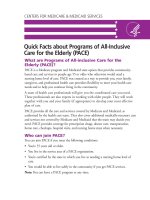Webinar Inclusive Sourcing
Bạn đang xem bản rút gọn của tài liệu. Xem và tải ngay bản đầy đủ của tài liệu tại đây (4.79 MB, 43 trang )
Inclusive Sourcing: A Key Pillar of Sustainable
Procurement
29 May, 2013 – 10:00 AM EST
Questions
Technical Difficulties: If you have
technical issues, please let us know
by typing a message in the
Questions pane (A). You can raise
your hand (B) if we do not respond.
Q&A: We will be taking questions on
content at the end, but you can send
them to us throughout the webinar
by using the Questions pane (A).
Please specify to whom the question
should be directed.
Example: Question for John Doe: What are the
Guiding Principles?
B
A
Agenda
Introductions
Lauren Gula, Human Rights and Women’s Empowerment, UN Global Compact
The Women’s Empowerment Principles
Laraine Mills, Private Sector Partnerships Specialist, UN Women
Why Inclusive Sourcing is Important
Elizabeth Vazquez, CEO and Co-Founder of WEConnect
Company Examples
Hilary Parsons, Public Affairs Manager, Nestlé
Marcela Navarro, Corporate Banking Division, RBS
Women Vendors Exhibition and Forum
Meg Jones, Women and Trade Programme Development Manager, ITC
Discussion/ Q&A
Introductions
Women’s Empowerment Principles
WEPs in Brief:
1. Establish high-level corporate leadership for gender equality.
2. Treat all women and men fairly at work – respect and support human rights and nondiscrimination.
3. Ensure the health, safety and well-being of all women and men workers.
4. Promote education, training and professional development for women.
5. Implement enterprise development, supply chain and marketing practices that empower women.
6. Promote equality through community initiatives and advocacy.
7. Measure and publicly report on progress to achieve gender equality.
Principle 5: Implement Enterprise Development, Supply Chain and Marketing Practices that Empower Women
Enterprise Development, Supply Chain and Marketing Practices
• Expand business relationships with women-owned enterprises, including small businesses, and
women entrepreneurs
• Support gender-sensitive solutions to credit and lending barriers
• Ask business partners and peers to respect the company’s commitment to advancing equality and
inclusion
• Respect the dignity of women in all marketing and other company materials
• Ensure that company products, services and facilities are not used for human trafficking and/or
labour or sexual exploitation
Inclusive Sourcing:
A Key Pillar of Sustainable Procurement
May 29, 2013
Why Women at Global Level
• According to the IFC, women-owned
businesses represent 32-39% of all
private businesses globally
• Women do 66% of the world's work,
receive 10% of the income, and
own 2% of the property
• Women make over 70% of consumer purchasing decisions and
impact over US$20 trillion in annual global spend
• Women represent 50% of the world’s population, but they are
almost invisible in global value chains as suppliers with just 1% of
the spend on vendors by large corporations and governments
© WEConnect International, 2013, Page 8
About WEConnect International
• Mission is to empower women business owners to succeed in global
markets
• 501(c)(3) global non-profit incorporated in 2009 based on the WBENC
model, WEConnect International’s official U.S. partner
• Represents over $700 billion in annual purchasing power
• Board of Directors elected by and from corporate members
• In countries that represent over 50% of the world’s population
including Australia, India, China,
Canada, top markets in Europe
and Latin America, and plans for
expansion into Africa and
Indonesia in 2013
© WEConnect International, 2013, Page 9
WEConnect International Corporate Leadership
© WEConnect International, 2013, Page 10
Supplier Diversity and Inclusion
• Supplier diversity is the proactive business process of sourcing
products and services from previously under-used suppliers
• The process of inclusive sourcing helps to sustain and
progressively transform a corporation's supply chain to reflect the
demographics of the communities in which it operates
• Examples of diverse businesses include companies owned by:
women, ethnic minorities,
people with disabilities, veterans,
and lesbian, gay, bisexual, or
transgender people
© WEConnect International, 2013, Page 11
Global Business Case
• Grow revenue
• Create more competitive and dynamic supply options
• Reduce costs and demonstrate ROI
• Improve total value of offerings
• Drive innovation
• Enhance image / brand with customers
• Contribute to economic opportunity in target markets
• Help ensure healthy families and communities because women
reinvest most of their income into their families and communities
© WEConnect International, 2013, Page
1212
Contact
www.weconnectinternational.org
© WEConnect International, 2013, Page 13
Nestlé in society:
Empowering women in
our supply chain
Hilary Parsons
Public Affairs Manager
Nestlé at a glance
•
•
•
•
•
•
•
15
5 December 2016
Founded in 1866 in Switzerland as an infant nutrition company
CHF 92 billion in sales in 2012
339,397 employees
468 factories in 86 countries
32 R&D and technology centres
2,000+ brands
more than 1 billion Nestlé products sold every day
Nestlé in society: empowering women in our supply chain
Nestlé in society: Creating Shared Value and
meeting our commitments
16
5 December 2016
Nestlé in society: empowering women in our supply chain
Women in our supply chain
• Working directly with more than 690,000 farmers
• Our Rural Development Framework includes a gender component
• We have Responsible Sourcing Guidelines covering 12 key commodities
• Our action plan on cocoa is the first commodity-specific plan but work will be
extended to cover milk and coffee
• Have expressed to UTZ and Fairtrade our willingness to work together to help
address gender issues through certification
17
5 December 2016
Nestlé in society: empowering women in our supply chain
Our milk supply chain
• Working directly with 456,000 small-scale dairy farmers in more than 30
countries
• Support for women farmers in India and Pakistan including technical assistance,
free veterinary service, provision of subsidies and loans
• 217 clean drinking water facilities for more than 100,000 children in village
schools in our dairy districts in South Asia
18
5 December 2016
Nestlé in society: empowering women in our supply chain
Our cocoa supply chain
• Working directly with 43,000 cocoa farmers
• Launched an action plan to promote and support lives of women in our cocoa
supply chain
• FLA’s assessment of our cocoa supply chain in Côte d’Ivoire in Spring 2014 will
include gender issues
• Aim to progressively integrate gender aspects into the Nestlé Cocoa Plan, which
covers approx. 25% of Nestlé global cocoa usage
19
5 December 2016
Nestlé in society: empowering women in our supply chain
Our coffee supply chain
• Working directly with 190,000 coffee farmers
• Support for farmers aimed at increasing crop quality and productivity, as well as
increase in farmer income
• In 2012, Nestlé incorporated a lighthouse approach to tackle the empowerment
of women and youth as part of our existing initiatives within the community.
20
5 December 2016
Nestlé in society: empowering women in our supply chain
More available at: www.nestle.com/csv
21
5 December 2016
Nestlé in society: empowering women in our supply chain
The Royal Bank
of Scotland
Marcela Navarro
London, May 29, 2013
The Royal Bank of Scotland
“The social responsibility of a company was
to increase its profits”
Milton Friedman
The Royal Bank of Scotland
[Successful companies are] “organisations
which serve the needs of their customers,
provide a rewarding environment for those
who work for them, ..[…].., and support the
development of the communities in which
they operate”.
Financial Times Columnist, John Kay, 1998
Royal Bank of Scotland
Reconnecting with Society
